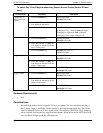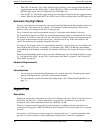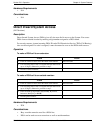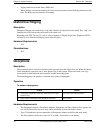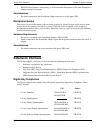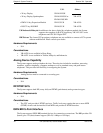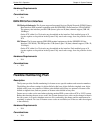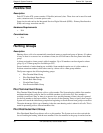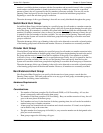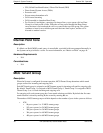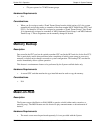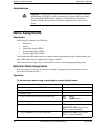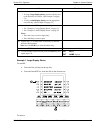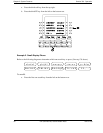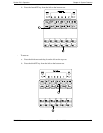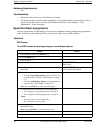
Section 700 - Operation Chapter 3. System Features
ICX-50-700 ICX (International) issued October 2000 47
member is available, the hunt continues with the first member and proceeds forward. After a complete
search and no available member is found (extension is busy or there is no answer for a specified
amount of time), the call is queued for the first member to become available. You can also set the
Queuing Timer and specify how the long the System will search the initial hunt group before
beginning to search the next hunt group or extension.
The main advantage of this type of hunting is that calls are evenly distributed throughout the group.
Switch Back Hunt Group
Switch Back Hunt Group initiates hunting in a specified group for calls made to a member extension
in the group. If the called member of the hunt group is busy, the System begins hunting forward to the
end of the group. If no member is available, the system hunts backward
from the called member. If no
member is available (extension is busy or there is no answer for a specified amount of time), the call
is queued for the first member to become available. You can also set the Queuing Timer and specify
how the long the System will search the initial hunt group before beginning to search the next hunt
group or extension.
The main advantage of this type of hunting is that calls can be directed to start with a selected portion
of the hunting group based on the directed number. However, all members are eventually searched.
Circular Hunt Group
Circular Hunt Group initiates hunting in a specified group for calls made to a member extension in the
group. If the called member of the hunt group is busy, the System begins hunting forward to the end of
the group and then moves forward
from the first member of the group. If no member is available
(extension is busy or there is no answer for a specified amount of time), the call is queued for the first
member to become available. You can also set the Queuing Timer and specify how the long the
System will search the initial hunt group before beginning to search the next hunt group or extension.
The main advantage of this type of hunting is that calls can be directed to start with a selected portion
of the hunting group based on the directed number. However, all members are eventually searched.
Next Extension/Hunt Group
Next Extension/Hunt Group lets you specify which extension or hunt group to search after the
Queuing Timer expires. This hunt group can be set as any type of hunt group, an attendant group, or
an extension (including virtual extensions).
Hardware Requirements
•N/A
Considerations
• If a member of the hunt group has Do-Not-Disturb (DND) or Call Forwarding - All set, that
phone is temporarily removed from the hunt group.
• If a member of the hunt group has Call Forwarding - Busy set and the extension is busy, the call
goes to the next phone in the hunt group.
• If all members are busy for the duration of the busy queuing timer, the call can be forwarded to
another hunt group or another extension.
• A hunt group can contain both real extensions and virtual extensions. If virtual, several phones
can be made to ring at the same time.
• The pilot number for a hunt group is flexible (i.e., any extension number can be designated as the
pilot [not a real extension]).
• Hunt groups support the following call types:



